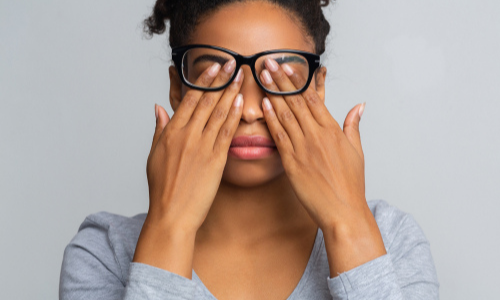
How Your Daily Habits Could Be Harming Your Eyes
Using old makeup, forgetting to wear your sunglasses, or even rubbing your eyes could increase your risk of developing an eye injury, disease, or infection. Fortunately, it's easy to avoid many types of eye problems by making a few changes to your usual routine. Your risk of eye issues could be higher if you do any of these things.
Rub Your Eyes
Like most people, you probably rub your eyes without even thinking about it when you're tired or your eyes feel a little uncomfortable. Rubbing your eyes may seem like a harmless habit but can cause several eye issues, including:
- Corneal Abrasions. These painful scratches develop on the cornea, the clear layer of tissue that covers your iris and pupil. You may be more likely to develop a corneal abrasion if there's a small piece of dust or debris in your eye when you rub it.
- Dark Circles Under Your Eyes. Vigorous rubbing may break small blood vessels under your eyes, causing the skin to look darker. Rubbing may also cause puffiness and wrinkles.
- Keratoconus. Keratoconus is a condition that occurs when your cornea thins and becomes cone-shaped. The condition distorts your vision and makes it hard to see clearly. Rubbing your eyes, particularly if you use your knuckles, may raise your risk of keratoconus, according to a French research study that appeared in the February 2020 issue of Cornea.
Touch Your Eyes Without Washing Your Hands
Washing your hands before touching your eyes is an easy way to avoid eye infections caused by bacteria, viruses, dirt, and other substances. Handwashing can also keep you healthier. Many viruses, including influenza, enter the body through the eyes and other mucus membranes.
It's particularly important to wash your hands before you put in or take out your contact lenses. If you handle your lenses with dirty hands, you might develop a severe infection that could cause permanent vision issues.
Leave Your Sunglasses at Home
Wearing sunglasses protects your eyes from the harmful effects of ultraviolet (UV) light year-round. Exposure to UV light increases your risk of cataracts, macular degeneration, cancer, and growths on your eyes. When you shop for sunglasses, read labels before you make your purchase. Sunglasses that offer 100 percent protection from UVA and UVB rays are the best choice.
Don't Wear Safety Glasses
Safety glasses protect your eyes on the job and at home. Wearing the glasses keeps chemicals, and slivers of wood, metal, glass, and other materials from damaging your eyes. Wear the glasses any time you work with dangerous chemicals or use machinery, including saws, sanders, drills, and lawnmowers.
Never Clean Makeup Brushes or Use Old Makeup
Your makeup habits may be the reason you develop a painful eye infection. Protect your vision by:
- Cleaning Brushes and Applicators at Least Once a Week
- Disposing of Eye Makeup After Three Months
- Throwing Out Eye Makeup if You've Had an Eye infection
- Avoiding Applying Eye Makeup in a Moving Vehicle
- Not Sharing Eye Makeup
Changing the way you apply eyeliner may also help you keep your eyes healthy. University of Waterloo researchers discovered that eyeliner migrated into the tear film of the eye much more quickly when it was applied to the inner part of the eyelid. Eyeliner can cause redness, discomfort sensitivity, and eye infections if it enters the tear film. The product can also build up on contact lenses, making them feel uncomfortable.
Spend Too Much Time Viewing Digital Screens
Dry eye, eyestrain, blurred vision, and headaches can occur if you don't take breaks from your digital screens periodically. The American Optometric Association recommends following the 20/20/20 rule to improve eye comfort. After viewing a screen for 20 minutes, look at an object 20 feet in the distance for at least 20 seconds.
If you've been working steadily for two or three hours, take a half-hour break that doesn't involve screens of any kind. Adding anti-glare filters and screens to devices and wearing computer glasses that block blue light can also be helpful.
Improving your daily habits and visiting the optometrist for checkups can help you protect your eye health. Has it been a while since you've had an eye exam? Contact our office to schedule your appointment.
Sources:
PubMed: Cornea: A Case-Control Study of Keratoconus Risk Factors, 6/20
American Academy of Ophthalmology: Corneal Abrasion and Erosion, 9/17/20
American Optometric Association: Computer Vision Syndrome
University of Waterloo: Study Finds Eyeliner Application May Cause Eye Problems, 4/1/15
American Academy of Ophthalmology: The Sun, UV Light and Your Eyes, Jun. 11, 2020
